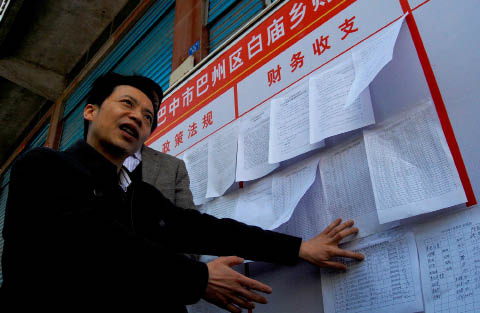|
The Power of the Public Eye
By staff reporter JIAO FENG
BAIMIAO is an out-of-the-way township in Bazhou District of Bazhong City, Sichuan Province. Linked only by a country road to the outside world, it nevertheless engineered a politically transforming experience by using information technology to create public watchdogs on government spending. In February 2010, Baimiao started to make its budgets and expenditures public via its government website. Every item – a RMB 1.5 letter pad, a bottle of wine tagged RMB 88 or a meal of RMB 1,269 – is clearly recorded. This act triggered some sizzling debates in the Chinese netizenry and the unknown township was soon in the midst of a storm of public opinion.
Baimiao is a typical poverty-stricken area; in 2009, the net per capita income was only RMB 3,393, and fully 95.5 percent of its 11,000 strong population are farmers cultivating less than 400 square meters per capita. Still it was sophisticated enough to benefit from the widespread controversy it generated.
 |
|
Zhang Yingshang, head of Baimiao Township, shows visitors how detailed items of government expenditure were published. Cnsphoto |
Show Us the Money
In 2002, Zhang Yingshang was appointed secretary of the Baimiao government's discipline inspection commission. His contact with locals forced on him the reality of the widening gap between residents' increasing demands for more oversight of government operations and the backward nature of local infrastructure for doing so. Moreover, a handful of corrupt officials had undermined the local government's credibility. "On seeing us officials leave a restaurant, some people would point at us; they believed public funds footed our bill," says Zhang. Such censure made him feel wronged, but also started him thinking.
In 2005, Bazhong City put forward a new motto: "Build a government in the sunlight." It set down regulations for public access to information on government affairs. Overseeing the implementation of the decree, Zhang Yingshang, who by the time had been promoted to be head of the township, noticed that making government affairs public is the best solution for resolving contradictions between common and 'insider' views about policies and needs.
In 2008, Zhang Yingshang was enrolled in a graduate program at the Party School of Bazhong City, where he met Wang Guoqi, the vice-president of the school and deputy director of the organization department of the Bazhong CPC committee. At that time, Wang was investigating the best methods of disclosing government spending to the public. "As regards government spending, what people are most concerned about is whether there is corruption involved," explained Wang. "Once everything is put on the table confidence in the government can be restored."
In their conversations the two men happily found that they were on the same page over officially-driven transparency for public funds, which both believe is a route to wider reforms of the political system. "After some debate we decided to take Baimiao Township in that direction. People deserve to know whether public funds have been misappropriated or not," said Zhang Yingshang.
Besides website access to records, the township prints out the expenditures and posts the list at government buildings where people, and in particular those not technologically inclined, can come to check them at any time. Over the past year financial expenditures have been made public every month, and the attentive will have found changes in the content. For example, entertainment in January 2009 accounted for more than half of the total government expenditure for that month; one year later it stood at only one percent of the government spending for the month. "This is a testimony to the power of public oversight," says Zhang. "The expenditures in 2010 shrank more than RMB 30,000 from the previous year," which is not insignificant for a township government that ran on a budget of RMB 120,000 in 2010.
|
